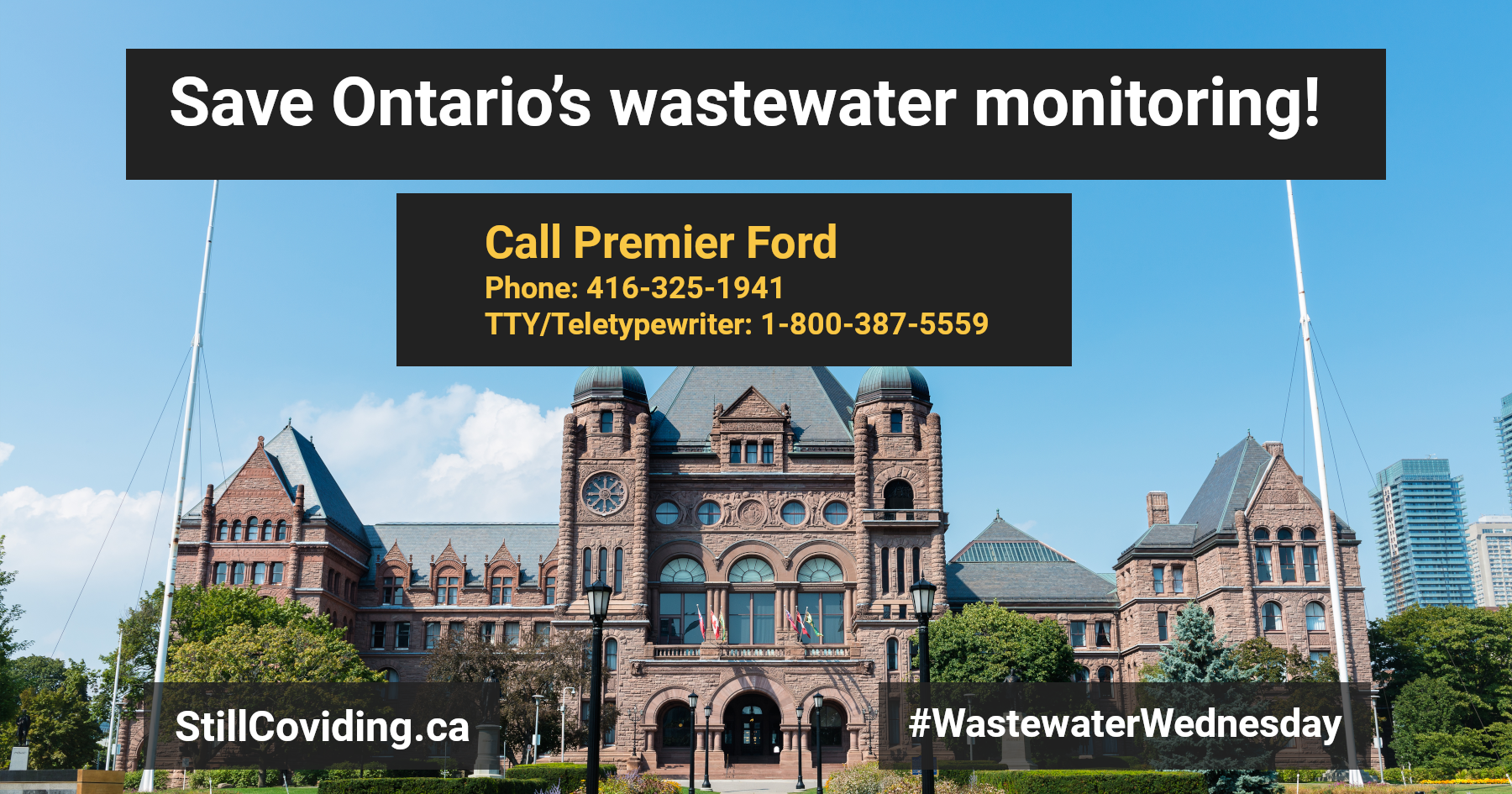📣 Take action! Let MPPs know you want funding for Ontario’s wastewater monitoring program to continue
📱 Call MPPs to voice your support for wastewater monitoring.
✉️ Use our online tool to send letters to MPPs.
✉️ Use our online tool to send emails to municipal councillors in Ottawa or Waterloo Region.
📸 Post photos on social media using the hashtags #WastewaterWednesday and #SaveWastewaterMonitoring! You can explain why wastewater monitoring is important to you. Take a selfie, while holding a sign with a message (e.g. “Save Wastewater Monitoring!” or “Save Our Science!”). You can tag MPPs and media.
Why take action? Wastewater monitoring is an essential public health tool that provides insights into the spread of SARS-CoV-2 and other viruses in Ontario’s communities.
Effective July 31, the Ontario government is planning to shut down the province’s extensive wastewater monitoring network, with 58+ stations providing coverage for 34 public health units. In its place, the Public Health Agency of Canada (PHAC) will have stations in just five cities. The federal government is not planning to take over the existing program, with experienced researchers at 13 universities who have pioneered the development of wastewater monitoring.
Please take a moment to voice your support for Ontario’s wastewater monitoring program!
Example of text you can read:
I’m very disappointed to hear about the government’s plan to cancel funding for Ontario’s wastewater monitoring program. Please ensure that Ontario’s Wastewater Initiative is fully supported by the province, with enhanced, stable funding. Wastewater surveillance is an essential tool in the public health toolbox. Monitoring for SARS-CoV-2, influenza, avian flu, RSV, mpox, and other viruses helps decision-makers and the general public make choices informed by science. Ending funding for Ontario’s wastewater surveillance network will have dangerous consequences. We will no longer have a reliable early warning system to inform everyone about the spread of emerging pandemic threats such as avian flu. The federal government’s program will not provide near real-time data, and its scope will be limited. It is also important to recognize that many people who are immunocompromised depend on wastewater monitoring to determine when to time risky activities such as medical appointments. Thank you for recording my concerns about the cancellation of Ontario’s wastewater monitoring program.
Some ideas for points to make during your calls:
- I’m very disappointed to hear about the government’s plans to cancel Ontario’s wastewater monitoring program. Please ensure that the program is fully supported by the province, with enhanced, stable funding.
- Wastewater surveillance is an essential tool in the public health toolbox. Monitoring for SARS-CoV-2, influenza, avian flu, RSV, mpox, and other viruses helps decision-makers and the general public make choices informed by science.
- Many people who are immunocompromised depend on wastewater monitoring to figure out when to time more risky activities such as medical appointments and travel.
- PHAC only provides data on a monthly basis. One-month-old data would be inadequate for the risk assessment needs of Ontario’s residents and hospitals. People with disabilities, the immunocompromised, and other equity-denied groups rely on daily wastewater data to time more risky activities such as medical and dental appointments, in facilities where universal masking has been dropped.
- Without funding, we will lose important information about the prevalence of COVID-19 infections and the spread of new variants.
- Ending funding for Ontario’s wastewater surveillance network will have dangerous consequences. We will no longer have a reliable early warning system to inform everyone about the spread of emerging pandemic threats such as avian flu.
- Cancelling the program will lead to economic losses. The cost of the program is nothing compared to the significant savings associated with preventing infections and hospitalizations.
- Without reliable data to estimate the risks, many people will choose to avoid spending money at local businesses.
List of contacts
If you’re viewing this website using a phone, you can tap on a phone number in the contact list to initiate a call.
| Name | Role | Phone |
|---|---|---|
| Doug Ford | Premier | 416-325-1941 |
| Andrea Khanjin | Minister, Environment, Conservation and Parks | 416-314-6790 |
| Sylvia Jones | Minister, Health | 416-327-4300 |
| Raymond Sung Joon Cho | Minister, Seniors and Accessibility | 416-314-0797 / 1-888-910-1999 |
| Marit Stiles | Leader, Official Opposition | 416-326-7202 |
| Bonnie Crombie | Leader, Ontario Liberal Party | 1-800-268-7250 |
| Mike Schreiner | Leader, Green Party of Ontario | 416-325-4664 |
| France Gélinas | Critic, Health | 416-325-9203 |
| Lise Vaugeois | Critic, Accessibility and Persons with Disabilities | 416-325-0069 |
| Adil Shamji | Liberal critic, Health | 416-325-0105 |
| John Fraser | Liberal critic, Seniors and Long-term Care | 416-325-4670 |
| Trevor Jones | Associate Minister, Emergency Preparedness and Response | 519-351-0510 / 1-800-265-3992 |
| Caroline Mulroney | President of the Treasury Board | 416-327-2333 |
| Victor Fedeli | Chair of Cabinet | 416-326-8475 |
| Peter Bethlenfalvy | Minister of Finance | 416-325-0400 |
| Natalia Kusendova-Bashta | Minister of Long-Term Care | 905-890-1901 |
| Todd Smith | Minister of Education | 613-962-1144 |
| Jill Dunlop | Minister of Colleges and Universities | 416-326-1600 |

